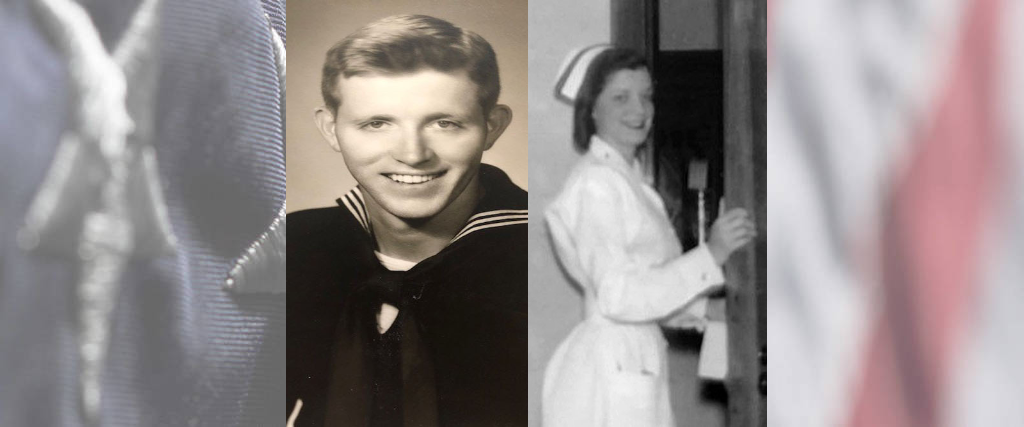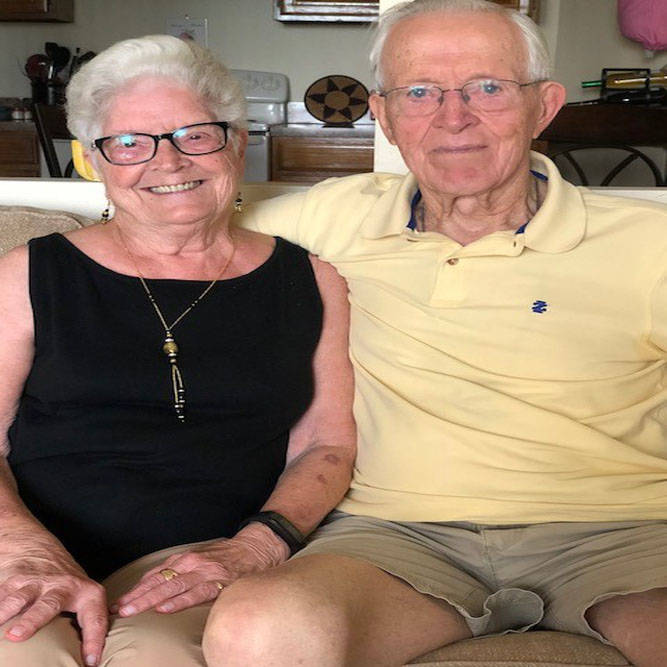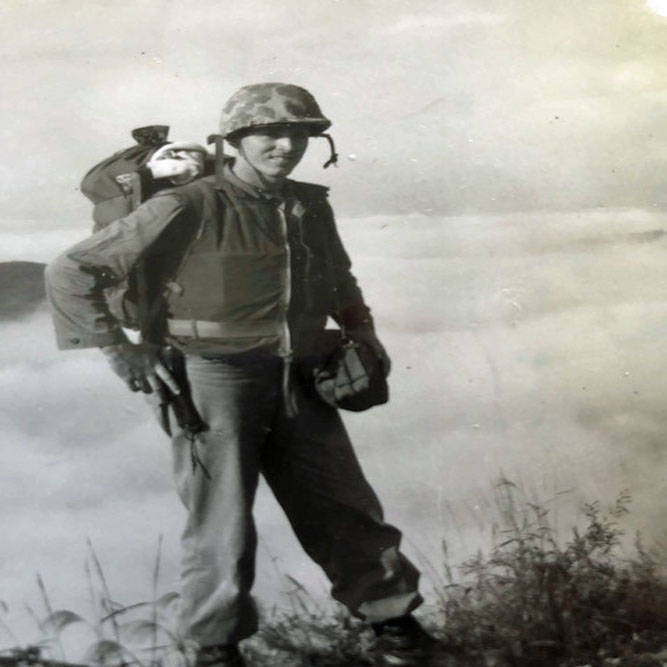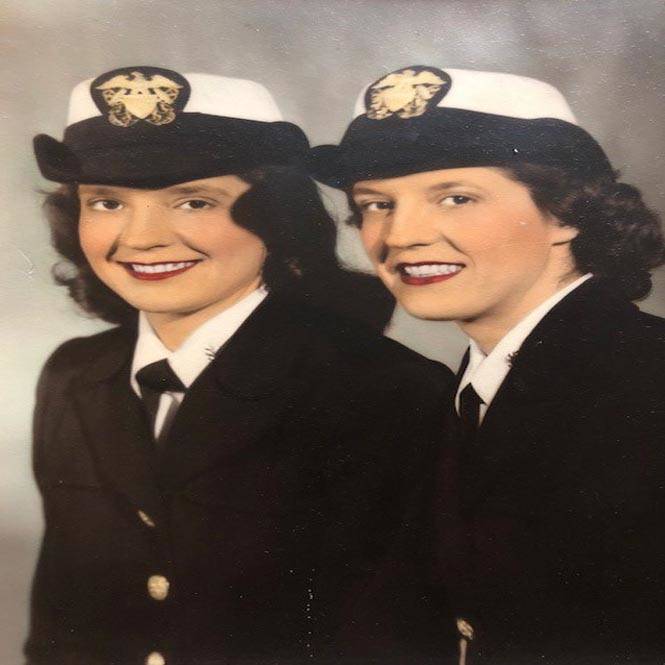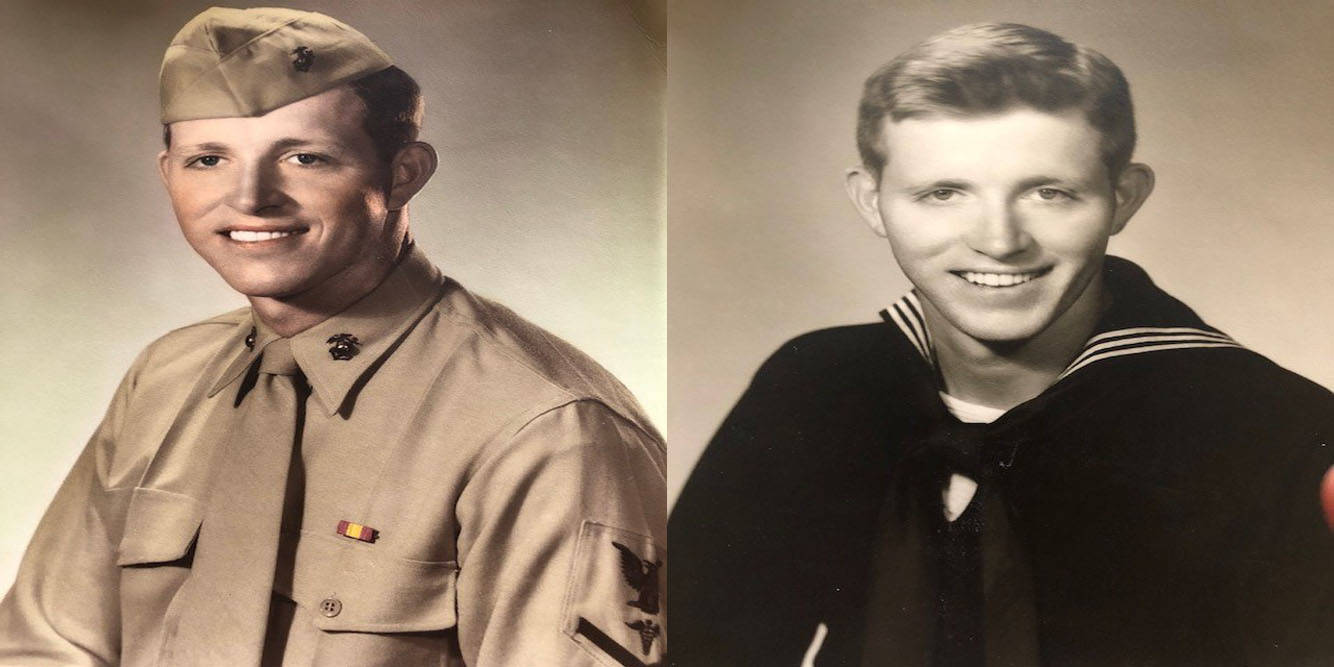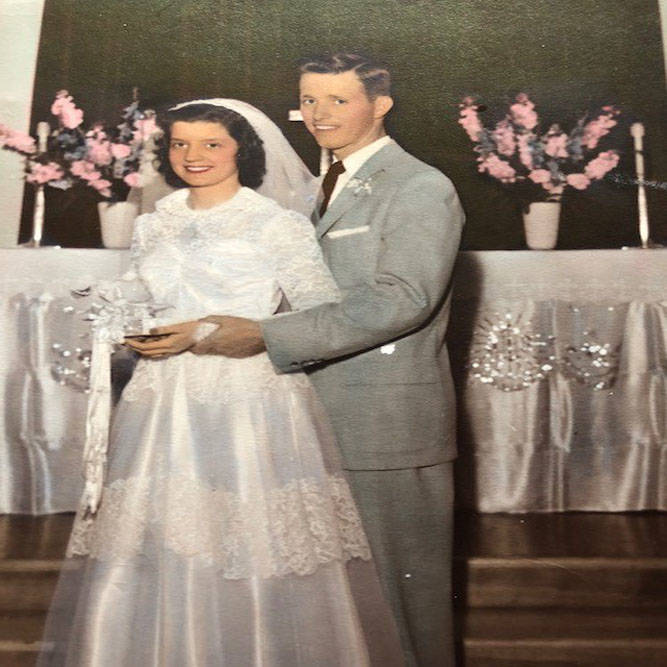U.S. Navy / Marine Corps Korean War Lombard, IL Flight date: 07/11/18
By Charlie Souhrada, Honor Flight Chicago Veteran Interviews Volunteer
Nancy Terry (and her twin sister, Peggy), were born April 3, 1930, in Whitehorse, PA, to Jackson and Winnie Terry. A few years later, the family, which also included a brother, Larry, moved to Honey Brook, PA, a tiny town west of Valley Forge. There, Nancy’s father worked in a small steel mill, while her mother kept house and worked in a textile factory to support the troops during World War II. “There wasn’t much to do in that town,” Nancy remembers. “We didn’t have a theater or a library. My sister and I would walk up to town and back again. If we did anything, we went to a soda fountain. That was a treat!”
Nancy and Peggy, known around town as “the Terry Twins,” did everything together, including enrolling in a three-year nursing training program in 1948. They earned matching registered nurse (RN) designations. “From the day we were born, my mother said we were going to be nurses.” After graduation, the Terry Twins worked in a small, community hospital for a year, then decided to enlist. “Our pay was terrible!” she says. “My dad has been in the Navy and he said, ‘why don’t you join the Navy? The pay there is better!’ I thought that was a good idea!”
After a brief stint at St. Albans Naval Hospital in Queens, NY, where the sisters’ Basic Training consisted of learning how to salute, they were reassigned to the Corona Naval Hospital in Corona, CA. According to Nancy, the hospital wasn’t the most “military” of places. It was created out of a luxury resort that had closed, then reopened in 1951 as a care facility for Korean War casualties. She remembers it was “all nursing” with very little time for fun. But, she does remember trying to avoid flagpoles so she wouldn’t have to display her salute! “The Navy corpsmen would stand around and oh, would they laugh when they’d see us salute!”
Nancy caught the eye of one of those corpsman at the only social outlet in town – a gas station that doubled as a night club – offering beer, wine and music from a record player. This particular corpsman didn’t laugh at Nancy; instead, he proposed and a 65-year marriage (and counting) began.
Matthew (Jim) Peters, the corpsman Nancy met, was born January 19, 1931, at Mercy Hospital in Iowa City, IA, not far from the family farm in Solon. Jim spent the first 20 years of his life working the farm with his parents Matthew and Charlotte, older brother John and his younger siblings Dorothy and William. The Peters worked a typical middle-Iowa family farm on 240 acres, where they raised hogs, cattle and sheep in addition to growing alfalfa, corn, oats and soybeans. During his elementary years, Jim walked to and from a one-room schoolhouse where he was often the only member in his grade. In 1948, he graduated from St. Patrick’s High School in Iowa City and enrolled at St. Ambrose College in Davenport, IA to study medicine. Unfortunately, he fractured his collarbone in a severe auto accident just before his sophomore year, placing his medical studies on hold. Although the incident delayed his formal education, it set the stage for his military service and put him on a path to meet his future bride.
“My mother and I went down to visit my brother who was in the Army at Fort Leonard Wood in Missouri. He had just gotten back from bivouac and was filthy, dirty, miserably hot. “I thought ‘this is a hell hole.’ I went home, and at a bar one night, some guys were talking about the Navy being a ‘cleaner’ life. I thought, Okay, it’s four years, but if this war ends, they’ll let us out. Well I was wrong! They didn’t let us out and I stayed in for four years.” Jim’s tour of duty began with his enlistment in August, 1951, and he was soon headed to the US Naval Base in San Diego for 11 weeks of boot camp.
“It was military. If someone tells you do to something you do it!” he remembers. “I came from a strong family. If my dad told me to do something I did it, so boot camp wasn’t a big deal for me!” After boot camp, he crossed San Diego Harbor to Naval Base North Island, where he waited for assignment. There, somebody told him that if he signed up to become a corpsman, he wouldn’t have to wash pots and pans. “That’s what prompted me to go down and become a striker.” In a stroke of luck, he was first in line for a 22-week-long corpsman class that was just starting, and thanks to being first, he was named adjutant for the class. “This was a good experience for me,” he says. “Being a farm boy, I never had any experience managing anything, so being in charge of a class of 40-50 people and giving them assignments was great! As the adjutant, when the class was over, I had first choice of where to go,” he remembers. “At the time, Corona and Mare Island near San Francisco were the hot spots. Who knows why, I decided Corona would be just fine!”
At Corona, Jim worked a hospital floor with one of Nancy’s friends, Mary Boyle. One night, at the gas station/nightclub, Jim walked over to talk with Mary who was sitting in a booth with Nancy. “We hit it off and first thing you know, we were going together!” he remembers. “To be perfectly honest, there were no officers around for nurses to date,” says Nancy. “So, all the nurses would date the corpsmen!” Jim says, “I was the only one around!”
On May 9, 1954, Jim and Nancy got married and enjoyed a brief honeymoon before Jim was sent to Korea. Nancy worked the night before and didn’t get any time off, so they wedged their wedding and a trip to Las Vegas into a weekend, in-between her assignments. “Nancy was coming off night duty, going on day duty, and she got a couple of days each way,” Jim says. “We got married on Sunday morning, went to Vegas, came back Thursday morning and that was it, my orders were in.” According to Nancy, this was standard operating procedure, as the Navy typically shipped newly-married corpsmen out.
A few days after their wedding ceremony, the newlyweds parted ways. Nancy continued her tour of duty at the Corona Naval Hospital, while Jim headed to Camp Pendleton, near San Diego, to serve as a corpsman with the Marines. There, he experienced “Marine” training over the summer months, enjoyed weekends with Nancy, then traveled to Korea in August, 1954, aboard the troopship USS General A. W. Brewster.
“The 6,240 mile trip took 17 days and the food was lousy!” he remembers. After an overnight stop in Sasebo, Japan, the Brewster landed at Incheon on Labor Day Weekend, 1954. There, Jim was given his assignment as company corpsman for D “Dog” Company, Second Battalion of the 7th Marines. “We were situated about a dozen miles from the demilitarized zone,” he says. “There was a line of Marines in front of us and a line of Marines behind us. We held our places up in the hill in the event of an invasion. Fortunately, the war was over by that time and nothing happened.”
In February, 1955, Nancy was discharged and she joined Jim’s family back in Iowa to work on the farm. “Oh, I worked!” she says. “I think they got a kick out of watching me. Of course, I’m stubborn enough that I was going to do it all!” One month later, the Army assumed control of Jim’s Marine battalion and they were all sent back to the States. After a brief furlough to visit Nancy’s family in Pennsylvania, the couple returned to California where they rented an apartment in Riverside and waited for Jim’s discharge papers.
Once their military careers were behind them, the couple returned to Iowa where Nancy went to work at the VA Hospital in Iowa City and Jim resumed his farming career with his dad and two brothers. “I knew that Nancy wanted more and I started feeling guilty about not taking advantage of the GI Bill. So, we packed our bags and took off in the spring of ’57 to return to St. Ambrose College.” One year later, he was admitted to the University of Notre Dame in South Bend, IN, where he studied business and Nancy worked in the infirmary. One day, while working in the infirmary while pregnant with their first daughter Kathleen, the nuns paid Nancy a visit. “They came to me and said, ‘we think you should quit’,” she recalls. “I asked them why and they said, ‘We don’t want these students to see a pregnant woman!’ But I didn’t quit!” she laughs.
After graduation in 1960, Jim joined the National Institutes of Health (NIH) in Bethesda, MD, as a management intern. His timing couldn’t have been better because Congress had just passed the International Health Research Act, which provided money for grants and loans to foreign countries to facilitate information exchange. This opened the door for Jim, who earned an assignment with the NIH office of international research as an administrator based in Tokyo. As a result, Jim, Nancy, and their two-year-old daughter moved to Tokyo in 1962, where Jim traveled extensively throughout southeast Asia. Nancy managed a series of household moves, Kathleen became fluent in Japanese and a second daughter, Ann Margaret, joined their family. In 1966, after more than three years overseas, the Peters returned to the US where Jim continued his career at NIH. The couple added two boys to their growing family – James, in 1967 and Danny in 1969.
Jim then built an extensive resume in higher education and medical research through a series of moves that included roles at Rutgers, back to NIH, Cornell, the University of Rochester, and New York Medical College in Westchester, NY, where he served as vice provost, until his retirement in 1991.
In retirement, the couple has kept themselves busy. Initially, they settled in South Haven, MI, moved to Chandler, AZ in 1997, then in 2015, relocated to the Chicago suburbs to be closer to their children, grandchildren and great-grandchildren. At their retirement community in Lombard, they’ve joined just about every club they can find, attend church every morning, work out frequently, volunteer in charitable activities, play cards and try to beat each other in fierce backgammon games.
They speculate they’ve moved more than 20 times during 65 years of marriage; Nancy jokes that they’re enjoying a good life because Jim squirreled away the extra money from every pay raise he ever received. As for the Korean War, Nancy looks back on that time fondly. “It was the best thing that ever happened to me, meeting Jim … I was happy. I wasn’t happy about the war. I wished that I could have done more, but I was proud to be a Navy nurse!”
Thank you, Jim and Nancy for your service to our country! Enjoy your day of honor together!



